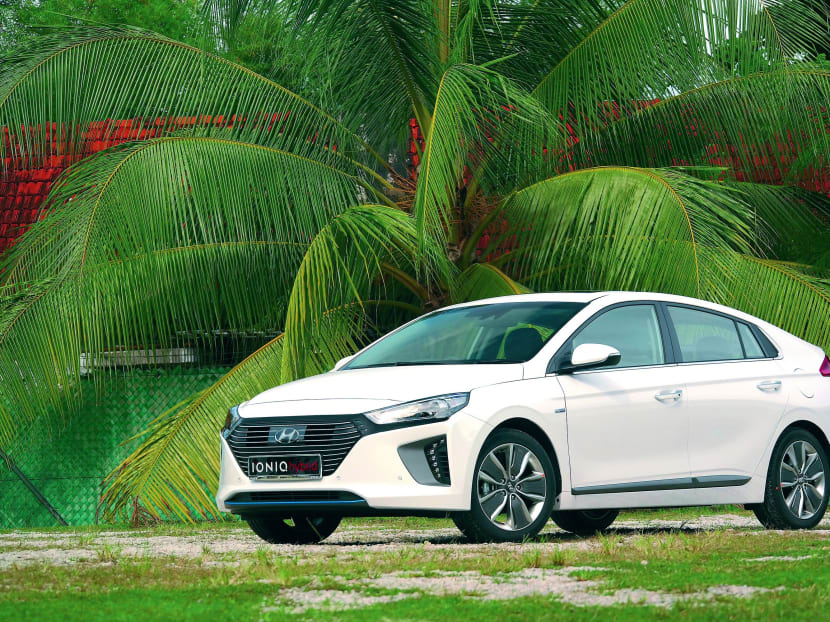Ion cannon: Hyundai’s Ioniq Hybrid car is a blast
SINGAPORE — In the Star Wars universe, ion weapons are used to disable enemy ships — seen most recently in the movie Rogue One, where the Rebels use ion torpedoes to make an Imperial Star Destroyer suffer a massive power outage.

The Hyundai Ioniq has been benchmarked against Toyota’s Prius. Which will prevail in the hybrid wars? Photo: Big Fish
SINGAPORE — In the Star Wars universe, ion weapons are used to disable enemy ships — seen most recently in the movie Rogue One, where the Rebels use ion torpedoes to make an Imperial Star Destroyer suffer a massive power outage. It was a force multiplier in a Jedi-less world that allowed the Rebels a crucial advantage over the established might of the Imperials.
Which is why it is a perfect metaphor for Hyundai’s Ioniq Hybrid. While the Korean company has considerable experience with hybrids, the Ioniq is the marque’s first global effort to build an eco-friendly passenger car.
A NEW HOPE
“The Ioniq is the first project that Hyundai has ever made that is exclusively for eco cars,” Dr Ahn Byungki, the director of Hyundai’s eco car performance group, told TODAY in an interview earlier this year.
Hyundai is up against a seemingly immovable force: Japanese carmaker Toyota, which rules the hybrid world. As of May last year, its cumulative global hybrid sales stood at just over nine million. “We’re like David and Toyota is Goliath,” Dr Anh said.
Some 3.7 million of Toyota’s hybrid sales are from the best-selling hybrid car in history, the Prius hatchback, and the Ioniq intends to disrupt this.
The Ioniq has been benchmarked against the Prius: The Hyundai is a tad longer and wider, but both cars have the same wheelbase, almost the same height, the same aerodynamic drag figure (a low 0.24cD), and a 0-100kmh acceleration time of 10.8 seconds.
But Hyundai’s approach is different. Firstly, the Ioniq will debut globally in three variants, with a plug-in hybrid and full-electric version in addition to the conventional hybrid shown here, although Singapore only has the latter for now.
While the Ioniq has the same split-window hatchback layout as the Prius and Honda’s Insight, the Korean’s interior is at once more familiar. It resembles the cabin of an Elantra sedan (which is no small praise) although the Ioniq introduces a techno-cool grey and blue colour scheme, active instrument panel and lovely-to-use steering wheel.
The latest Prius already has hugely improved handling over its predecessors, but the Ioniq feels like it has a slight edge over the Prius in terms of dynamics. Hyundai’s engineering choices (more power, dual-clutch gearbox) give it the feeling of more direct acceleration, even if the 0-100kmh figures are identical. Its wider tyres also provide better overall grip. You might not carve through corners with glee, but it still feels like a modern hybrid.
The Ioniq really stretches away from the Prius in equipment and safety. The Ioniq has technology usually reserved for luxury sedans, such as blind-spot indicators, autonomous braking, adaptive cruise control and six airbags.
It is also comfortable, with air-conditioned seats, good legroom and wonderful implementation of Qi wireless smartphone charging. These high-tech touches make the Ioniq feel special to drive and very different from other Hyundai sedans.
Hyundai even offers a 10-year battery warranty on its LG Chem-supplied lithium batteries, in addition to the standard five-year automobile warranty on the Ioniq.
The Ioniq is a truly impressive package. Refinement is better than the Prius at high speed, with much less wind noise entering the cabin. As a hybrid, you will pull away from stop lights silently, and it has the usual bag of tricks to make every drop of fuel count.
THE EMPIRE STRIKES BACK
Yet it is here that the Prius casts its green-tinged shadow the longest. On paper, the Ioniq’s fuel efficiency beats the quoted 3.7L/100km of the Prius. But in our sub-100km test drive around Singapore, the Ioniq delivered 4.4L/100km. From our experience, the Prius often betters 4L/100km easily. A definitive head-to-head would clarify things further, but it is inarguably the most important point, eco credibility, in which the Prius delivers its riposte.
The Ioniq is a tough rival to the Prius. Even if it is not quite as green, it is still a great performer. But will the Ioniq become more than just a disruptor?
The Ioniq’s keen pricing makes it a much better mainstream contender than the Prius, but it is likely overseas — where the full range of Ioniqs is available — that the Hyundai hybrid will upset the green apple cart.
Hyundai Ioniq Hybrid
Engine: 1,580cc, in-line four, 105hp, 147Nm
Hybrid system: 44hp electric motor, 1.56kWh lithium ion battery, 140bhp total power
Performance: 185kmh, 0-100kmh: 10.8s, 3.4L/100km, 79g/km CO2
Price: S$118,888 with COE
On Sale: Now
PROS: Polished drive, lots of features, approachable price tag
CONS: Not quite as fuel efficient as the Prius





